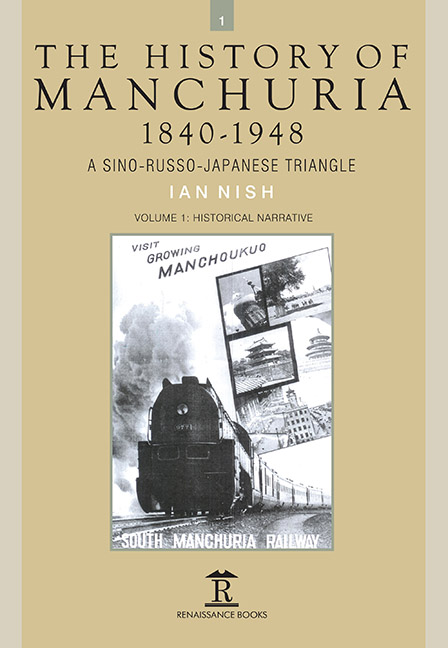Book contents
- Frontmatter
- Dedication
- Contents
- Preface
- Acknowledgements
- Name Conventions
- List of Abbreviations
- List of Maps
- Chapter One Manchuria and Russian Ambition, 1840s–1890s
- Chapter Two Sino-Japanese War and After, 1894–1900
- Chapter Three Prelude to the Russo-Japanese War, 1900–1905
- Chapter Four Railways, Reforms and Revolutions, 1906–1914
- Chapter Five Wartime Turmoil in Manchuria, 1915–1922
- Chapter Six Chang Tso-Lin’s Manchuria, 1922–28
- Chapter Seven Chinese Nationalism and Foreign Railways, 1929–1931
- Chapter Eight Lytton Commission in Manchuria, 1931–1932
- Chapter Nine Manchukuo: From Republic to Empire, 1933–1937
- Chapter Ten A Decade of Wars, 1938–1948
- Epilogue
- Map
- Select Bibliography
- Index
- Volume 2: Select Primary Sources
- Miscellaneous Frontmatter
- Dedication
- Miscellaneous Frontmatter
- Chapter 1 1840–1894
- Chapter 2 1895–1899
- Chapter 3 1900–1905
- Chapter 4 1905–1914
- Chapter 5 1915–1922
- Chapter 6 1922–1928
- Chapter 7 1929–1931
- Chapter 8 1931–1932
- Chapter 9 1933–1937
- Chapter 10 1938–1948
- Apendix Appeal by the Chinese Government
Chapter Five - Wartime Turmoil in Manchuria, 1915–1922
Published online by Cambridge University Press: 18 November 2023
- Frontmatter
- Dedication
- Contents
- Preface
- Acknowledgements
- Name Conventions
- List of Abbreviations
- List of Maps
- Chapter One Manchuria and Russian Ambition, 1840s–1890s
- Chapter Two Sino-Japanese War and After, 1894–1900
- Chapter Three Prelude to the Russo-Japanese War, 1900–1905
- Chapter Four Railways, Reforms and Revolutions, 1906–1914
- Chapter Five Wartime Turmoil in Manchuria, 1915–1922
- Chapter Six Chang Tso-Lin’s Manchuria, 1922–28
- Chapter Seven Chinese Nationalism and Foreign Railways, 1929–1931
- Chapter Eight Lytton Commission in Manchuria, 1931–1932
- Chapter Nine Manchukuo: From Republic to Empire, 1933–1937
- Chapter Ten A Decade of Wars, 1938–1948
- Epilogue
- Map
- Select Bibliography
- Index
- Volume 2: Select Primary Sources
- Miscellaneous Frontmatter
- Dedication
- Miscellaneous Frontmatter
- Chapter 1 1840–1894
- Chapter 2 1895–1899
- Chapter 3 1900–1905
- Chapter 4 1905–1914
- Chapter 5 1915–1922
- Chapter 6 1922–1928
- Chapter 7 1929–1931
- Chapter 8 1931–1932
- Chapter 9 1933–1937
- Chapter 10 1938–1948
- Apendix Appeal by the Chinese Government
Summary
THE YEARS OF the First World War and the peace-making were years of trouble and bitterness for China. It was a decade of domestic turmoil as the dictatorship of President Yuan Shi kai made way for a struggle between the major warlords and the coalitions which they constructed in their search for power. For the Chinese the redeeming feature was that their country found an ally in the United States which from comparative reticence in 1915 became much more vocal in support of China after 1918. There was much high-level diplomatic activity involving Manchuria but little in which the ‘Manchurians’ were directly involved. The settlement of the China question at the Paris peace conference of 1919 concerned Shantung, not Manchuria. The Washington Conference of 1921–1922 professed to offer a wide-ranging settlement for the Pacific area but scarcely touched Manchuria. Nonetheless, Manchuria was at the centre of two world-shattering issues: the 21 Demands crisis of 1915 and the Siberian Intervention of 1918–1923. Its future was greatly affected by their outcomes. And the railways which were the focus of our attention in earlier chapters still played a central part in the story and were vital for the economic prosperity of the territory. But they in turn generated rivalry between Russia and Japan and disputes between an increasingly nationalistic China and the Bolsheviks who took over the tsarist acquisitions.
Change was in the air. President Yuan Shi kai was not a popular president. After his great failure with Japan in 1915, which in the manner of dictators he hailed as a victory, he put out a suggestion that the monarchy, a constitutional monarchy, with himself as the emperor, should be restored, thus jettisoning the short-lived republic. He may have hoped to enlist support from the Japanese but they showed no willingness to encourage or offer funds. Elsewhere in the world there was acquiescence rather than approval: with the world at war there was no idea of interfering; better leave it to the Chinese themselves. But there was much hostility in China itself. Yuan therefore gave up the idea and died in June 1916 unfulfilled.
- Type
- Chapter
- Information
- The History of Manchuria, 1840-1948A Sino-Russo-Japanese Triangle, pp. 80 - 100Publisher: Amsterdam University PressPrint publication year: 2016

